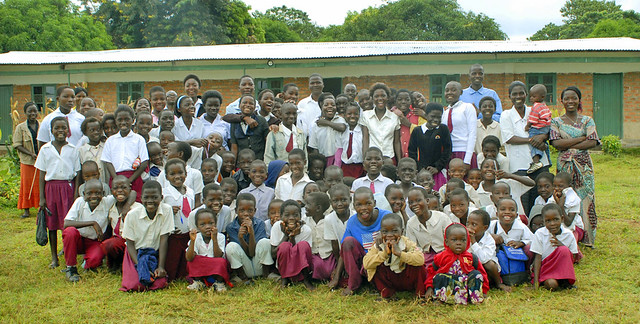 Ganet’s Adventure School is an innovative and successful primary school educating over 230 children in northern Malawi. The school was established in 2004 by its current director, Gertrude Banda. It was established in response to a lack of preschool care for children in the community, and has since expanded to incorporate primary school classes due to demand from parents.
Ganet’s Adventure School is an innovative and successful primary school educating over 230 children in northern Malawi. The school was established in 2004 by its current director, Gertrude Banda. It was established in response to a lack of preschool care for children in the community, and has since expanded to incorporate primary school classes due to demand from parents.
The school is recognised across Malawi as being an example of a well-run, innovative non-government school. It won a 2012 Pan African Award for Entrepreneurship in Education from Teach a Man to Fish. The school is regularly used by the Ministry of Education as an example to show other schools in the area.
Aim of the feeding programme and gardens
The original funding application in 2013 set out the following aims: “We want to help Ganet’s Adventure School become more sustainable and self-sufficient by funding improvement of and significant extension to the existing permaculture feeding garden, and helping to establish a school feeding programme to enable all children to receive one nutritious meal during the school day.
Extending the garden will enable the school to increase crop yields to, firstly, provide fresh vegetables to feed the children and, secondly, to help generate a small income for the school through sale of surplus crops.
Providing the equipment to establish a school feeding programme in addition to two years’ worth of food to supplement the vegetables grown at the school will enable all children to receive a nutritious meal during the school day. This is expected to improve the health, concentration and attendance of children at the school, many of whom are under-nourished and walk long distances to school with no breakfast."
Project outcomes
1. To improve the permaculture garden
Funding in 2014 was used to pay a worker and to buy seeds. The crops grown in 2014 were: okra, mustard, tomatoes, green peppers, cassava, potatoes, bananas, and sugar cane. These crops have been used to supplement the maize porridge which is the staple of the feeding programme and the older children cook the vegetables themselves. As well as providing vitamins and nutrients this helps to educate the children about cooking and healthy diets.
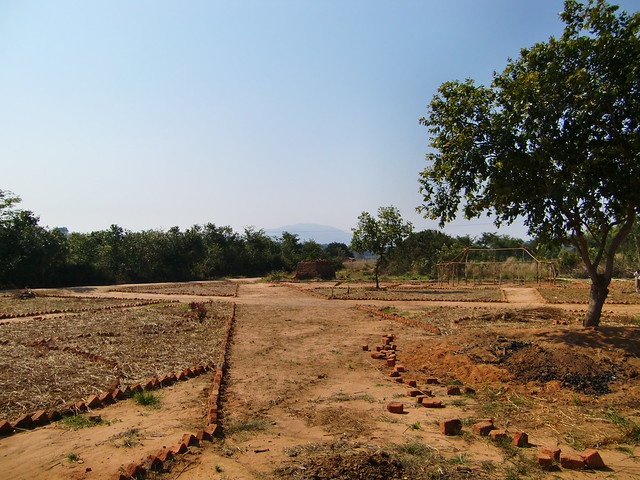
Creating the permaculture gardens – 2010
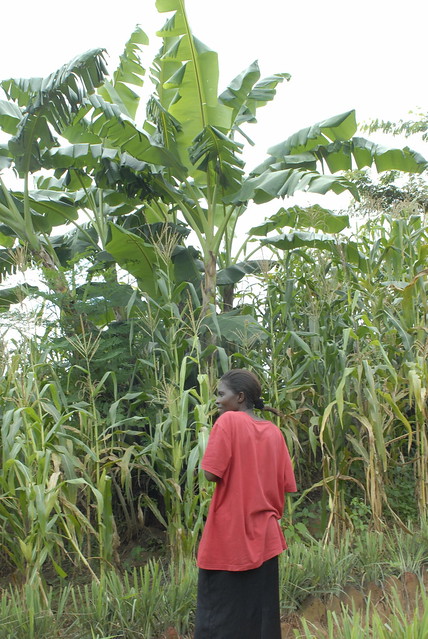 2. To extend the garden by two hectares with land donated by the Chief
2. To extend the garden by two hectares with land donated by the Chief
Funding has enabled the school to develop another garden on a two hectare site very close to the school. Funds paid for labour (three workers), tools, planting and inputs to the garden and the main crop grown is maize. The maize has been milled and made into maize flour which is used to make porridge, in order to supplement the feeding programme.
Due to flooding and drought the garden has not been as productive as was originally hoped for. However, the funding in 2014 enabled bunds to be constructed around the garden in order to protect it from future floods. Seeds were propagated for 2015 from the 2014 crop. Water tanks in particular would significantly increase productivity of the feeding garden and enable to school to produce more maize flour to supplement the feeding programme in future years – reducing food costs.
3. To provide the equipment necessary to cook and serve food in addition to food supplies in order to supplement the food grown in the gardens.
Funding has enabled the school to buy all the equipment needed to establish the feeding programme and also to buy food supplies to make the school meals. These meals have been provided every day or three times a week.
The staple meal is maize porridge, this is varied to ensure a more balanced diet, and supplemented by fruit and vegetables grown in the permaculture garden. Children receive either maize porridge, groundnut porridge (maize porridge with ground nuts) or soya porridge (maize porridge with soya beans).
The feeding programme has helped raise the profile of the school within the local community and with local government officials, many of whom attended the launch of the programme in April 2014 .
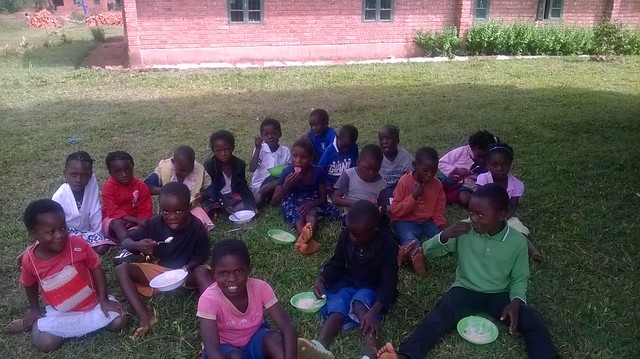
Feeding programme in action, photograph June 2014
Project Benefits
Children
The most significant impacts of the funding has been on the children. Attendance rates have increased significantly. According to UNESCO, only 58% of children in Malawi will complete a full course of primary school education.
Providing school meals is helping to ensure the children at Ganet’s Adventure School receive a full education. Levels of concentration and participation in class have noticeably increased, as reported by the teachers. Punctuality has improved, with children arriving at school on time. Prior to receiving school meals many of the children at the school did not eat until after school had finished, which had a significant impact on energy levels and concentration. The programme is helping to ensure that children receive the nutrition they need to stay healthier and absence due to sickness has reduced.
Teachers
The Director has also noticed a difference in the teachers, who also receive school meals as part of the programme. Many of the teachers did not previously eat until after school had finished, impacting their performance. Similarly to the children, the punctuality of teachers has increased. Teachers have more energy and the Director has noticed that they are working even harder than they did previously.
Parents and feeding committee
The feeding programme could not have been delivered so successfully without the involvement of parents and wider community. It has encouraged the community to become more involved in the school, as community members take it in turns to cook the school meals each day. In addition, the gardens have led to the employment of three members of the community. The Director of the school has set up a volunteer-run ‘Feeding Committee’ to oversee the programme – which is mainly made up of parents. In addition, mothers of the children take it in turns to cook the food to feed the children. The remit of this committee is to ensure the feeding programme is organised, that parents know when it is their turn to cook, and to make sure all the equipment is looked after. The committee members were chosen by the parents and are well organised, active and enthusiastic.
Challenges
Floods
The Nkhata Bay region in which the school is located was hit by huge floods in April 2014, the largest seen since 2001. Many people lost their homes and the school was badly affected. The school lost its toilets, kitchen hut and shelters which provide classrooms for the younger children. In addition almost all of the crops planted in the feeding garden and permaculture garden were lost.
Ganet’s Adventure School Fund launched an emergency appeal to raise money to repair the school. Luckily enough money was raised through donations to rebuild the toilet, kitchen hut and shelters. Although crops were lost, both gardens were replanted. In addition, measures to reduce the impact of future floods were implemented (building of bunds) to protect the gardens as far as possible. The floods meant that the feeding programme started later than anticipated and also that due to the loss of crops (and resulting shortage of food) at times has only been able to run three days a week.
Drought and irrigation
Drought is a universal problem in Malawi this year the drought has been severe and resulting in the loss of crops in the gardens. Rainwater harvesting tanks help to an extent.
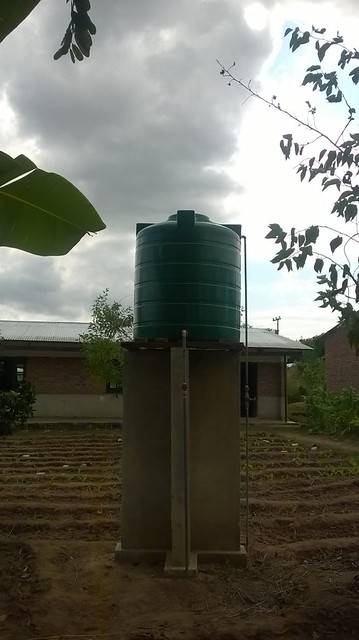
Inflation and price fluctuations
Prices in Malawi fluctuate regularly and significantly. Due to increased prices the school was not able to purchase all of the food supplies originally intended. Coupled with the loss of crops due to drought and floods this has meant that at times the feeding programme has only been able to run three days a week. Although still having a significant positive benefit the aim for the feeding programme is to run five days a week throughout term time.
You can read about how crops are being grown locally to use in the feeding programme here.
Ganet’s Adventure School Fund is a charitable trust registered in the UK (charity no. 1141352). We are a small organisation run by volunteers, set up purely to support the pupils of Ganet’s Adventure School. We have a long-term approach to assisting the school, having been working with it since 2005, and in this time have developed the necessary relationships and insights to best support it.
Anyone can help to raise funds for one of our other projects, from a compost toilet to a classroom – it’s amazing how a relatively small amount of money can make a permanent impact at the school. Please email [email protected] to find out how.
Ganet’s Adventure School Fund 59 Delawyk Crescent London SW2 2QP TEL: 07786 445921. www.ganetsadventureschool.org Ganet’s Adventure School Fund is registered in the UK with the Charity Commission, no. 1141352